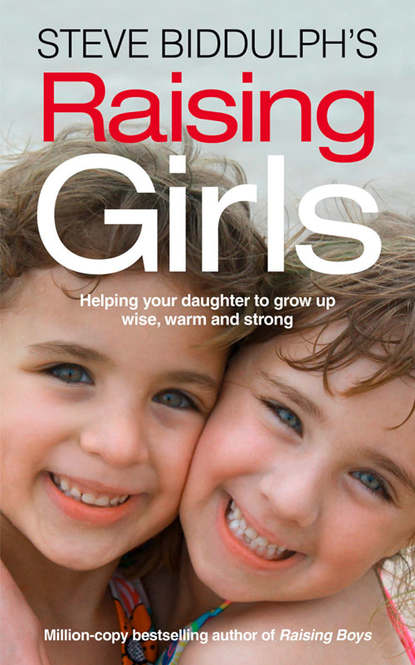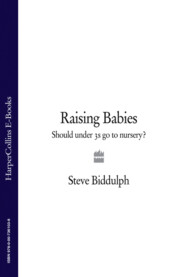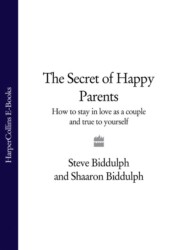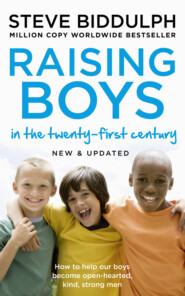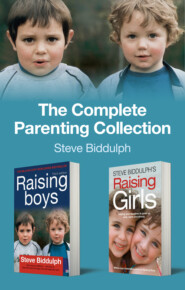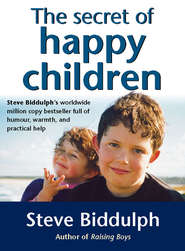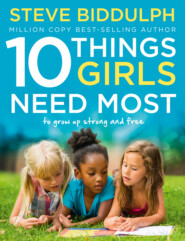По всем вопросам обращайтесь на: info@litportal.ru
(©) 2003-2024.
✖
Steve Biddulph’s Raising Girls
Автор
Год написания книги
2018
Настройки чтения
Размер шрифта
Высота строк
Поля
Many of us today feel unprepared for parenthood. A hundred years ago, most families had seven or eight children and their homes were noisy and crowded places, but often very happy ones. Everyone grew up with babies and toddlers around them and knew how to handle them. Today it’s very different. One study found that one-third of new parents have never held a baby before they get their own!
Luckily our hormones help with this inexperience. New mothers’ bodies flood with a hormone called prolactin. If you are lucky and can breastfeed your baby, then prolactin goes much higher in your bloodstream and makes you feel dreamy and slowed down. It helps you to focus and be there for your child. Other hormones help too; when you hug your baby, or your partner or a friend hugs you, the hormone oxytocin (the love hormone) makes you feel contented and settled.
Oxytocin is a remarkable hormone; it is released when we have an orgasm, it is released when we greet a friend, and when we eat food with someone, sitting together at a table, it increases in our bloodstream. At birth, if it’s a relaxed environment and we feel safe, it floods into us. You need all the oxytocin you can get! When people talk about bonding, it’s oxytocin at work. People who did not get enough love, and therefore enough oxytocin, often can be found seeking that satisfaction in other ways – through fame, doing drugs, compulsive sex, shopping, stuffing our face with unhealthy food. Or writing books!
Gabor Mate, famous for his work with drug addicts on Vancouver’s East Side, says that heroin, and the rush of wellbeing as the injected drug surges into your bloodstream, is a substitute, a mimic, of being loved – but with a much different result.
It’s all an attempt to get that oxytocin we didn’t get in our mother’s arms. So giving your baby lots of affection is a great liberator. It makes her strong and independent, and a people person who will love and be loved for the whole of her life.
HOW TO PLAY WITH A BABY
With your baby daughter, even from the very first weeks, playfulness can be at the heart of everything you do. This playful mood delights her, but it also makes ordinary tasks so much easier if she sees them as fun.
For instance, babies have to be bathed. Some parents just hurry through this briskly, but most mums and dads can’t resist the urge to make it a pleasure for their baby and themselves. They make sure the room is warm; they aren’t fussed about a bit of splashing; they swish the water around their baby, singing or chatting and making noises and, most, pleasurable of all, lift scoopfuls of water and pour it down her back or front, which she just loves. Many of us can still remember this from our childhood, the delight of warm soapy water on our skin, and a kindly person patting us dry with a soft towel.
At six months of age, when she can sit up, your daughter will tip water herself, squeeze a trickle from the washer, and pop soap bubbles. Bathtime can be a wonderland for her senses.
Even getting dressed, or having a nappy changed, goes better if done in a playful mood. Your daughter will fuss less because she associates this as a happy time. She will take all her cues from you; if you are stressed, she will fuss, because she is worried about you. If you are happy, she will be too.
When you play with a child you are starting something big. Child-development experts are now convinced that playing is what brings out our brain’s full potential.6 (#litres_trial_promo) Play unleashes lifelong creativity. The greatest discoveries have been made by playful minds being inventive and different.
A girl raised with a sense of fun will not be shy or dull, she will ‘think outside the box’ and bring this ability to whatever career she chooses. She will be able to get along with others in a happy way, because play is all about collaboration. Playfulness makes you confident and light-hearted, willing to try new things, it dispels stress and boosts your immune system. It makes you more active, which then promotes fitness and health.
If you aren’t a naturally playful person, just have a go! Play is as infectious as a baby’s laugh. You will soon find your daughter’s delight and natural capacity for fun captivates you and you both have a ball.
OUR BABY WILL FIT RIGHT IN (LOL!)
Have you ever talked with a young couple who don’t have kids, but plan to?
Often couples in that first flush of confident planning, especially those who are very success driven, will proceed into parenthood full of goals and high aspirations. ‘We will never …’, and ‘our child will …’. There’s a lot of ‘will’ and ‘won’t’ in their vocabulary, because before you have children, life actually sometimes responds to your intentions. You still have the illusion of control – something that real parents have long abandoned!
When talking to parents-to-be, it’s important never to disillusion them (you should never discourage the young!). A common claim of the not-yet-but-soon-to-be-childed is that ‘our baby will fit in with our lifestyle’. ‘If it learns to fit in right from the start, it will be that way all along.’ Experienced parents listen to these plans and do their best to contain their mirth.
I had some friends who were talking this way. They were both nurses and had put off starting a family, then when it came time to make babies, it took a while for it to happen. Finally they had their baby, and I didn’t hear from them for a while.
At the time I belonged to a trauma team, helping emergency service workers after especially stressful incidents. This work sometimes happened very late at night. One night driving home through Hobart at about 2 am, I saw a strange hunchbacked figure, shambling along the waterfront near Salamanca. There was a large lump on its shoulder, and it was clutching it and walking unevenly but resolutely along the deserted street. I have an active imagination, and I immediately thought – ‘It lives beneath the wharf! Creeping out at night to feast on pizza crusts, shunning the human gaze’. But as I drew closer, I recognised my friend! The hump on his shoulder was a baby. He was walking the streets with his baby at 2 am! He saw me and gave me two fingers and a grin – and I pulled over to see if he was okay. He just laughed as he read my thoughts: ‘This baby is fitting in with our lifestyle!’ He was walking the baby to get it to sleep, it was the only thing that worked.
Take it from me, babies do not fit in with your life. Babies take the Kleenex of your life and roll it into a snotty ball! If you do parenthood even half well, it will re-arrange your world. Babies do this in one especially important way (I’m not sure whether to whisper this or shout it, but here goes): You won’t come first in your own life for at least 20 years. If you’ve spent 20 or 30 years being a self-centred so-and-so, you will find parenthood extremely challenging. But it will be good for you. Hopefully parenthood, and your child, will reward you with enough love that you won’t mind this, but it’s important to know what you are in for.
(In our family this was definitely how it was. As mentioned earlier, we planned carefully for homebirths with great midwives and doctors on standby, and both times we had emergency caesareans. But you claw back what you can – I was there both times, trying not to faint, and I held our babies the second they emerged from behind the green sheets. A few hours after my son was born, I faced down a monster nurse who wanted to put a two-foot plastic tube into his stomach for a sample ‘just in case’. Our babies slept with me on the floor of the hospital room so that they were near their mum as she recovered from her operation. So I am not saying give up your ideals, but give up your well-planned perfect life, and learn to be flexible!)
Parenthood is so worth it, and so difficult, at the same time. Say goodbye to self-absorption. You never needed it anyway. It didn’t look good on you.
DON’T EDUCATE – JUST ENJOY
In recent years there has been an avalanche of products and programmes – DVDs, flashcards, books and expensive courses – to take advantage of parents’ anxiety to have a smarter child. Despite all this effort and expense, with babies being urged to read at two or play the cello at four, there is absolutely no evidence that these approaches have any benefit at all. In fact, such educative efforts may have real costs in making parents and child more anxious and their relationship more strained. It’s tempting to say that any product or place with the words ‘Early Learning’ in its title should be avoided at all costs. I’m not saying that, but it’s tempting!
Of course babies and toddlers love stimulation, but it’s how we go about it that matters. Studies of vocabulary acquisition (learning and using lots of words) have found something very interesting: kids do not get a larger vocabulary from being hammered with stimulating words and ideas. Researchers have found that the toddlers with the most words in their repertoire are the ones whose parents listen to them the most. It’s not hearing lots of words, but using and enjoying them that fixes them in your child’s memory. Children remember words when they experience the power of words to interest and engage others. ‘Give me the teddy, Daddy’ (Father uses the teddy to tickle his daughter, making her giggle). ‘No, Daddy, give me the teddy SLOWLY.’
So we have to take the pressure out of parent-child relating. The very best thing you can do with your little girl is enjoy her. Chatter mindlessly to her – this really does come naturally if you let it. Singing and gooing and being funny with a baby (which is exactly what makes them prick up their ears, smile or giggle) helps her attunement to language as an exciting tool that makes people do things. An uneducated rural mother in the third world, or a teenage mother with a good sense of fun often does a better job of this than someone with a degree in business administration – because they know how to relax and enjoy.
What if being around babies doesn’t come naturally to you? If you had a chilly or distant and uptight childhood with parents who had those attributes too? Playfulness may not come naturally at first but it will happen, if you don’t worry about looking or sounding silly (because that’s the point) and see what works to make your little daughter laugh and smile. She has a million years of mammalian history stored inside her, and like any kitten, puppy or wombat baby, she loves to do what develops her best – and that is play.
Not a second of babyhood is wasted. They are learning all the time and we are their teachers. These early months can feel dreamlike and unproductive to parents used to achieving all kinds of goals, but it’s actually the most productive time you will ever spend.
In a Nutshell
Little Lucy discovers that the world is a good place because her parents can be trusted.
Babies seek reassurance from us to manage their natural anxiety. We need to organise our lives so we can be calm and emotionally present, especially in those first six months.
The second six months of life is when your daughter acquires the basis of all her people skills – the rhythm of interaction and how to be peaceful.
Babies also need to be excited, played with and awakened to the fun of life. Luckily that’s not so hard.
Baby-stimulation products and programmes are usually a waste of money and may even just add stress to your relationship. Don’t educate, just enjoy.
Babies don’t fit into your lifestyle, you have to fit into theirs. Prepare to have your life turned on its head. Accept this and you will have a lot more fun and joy.
Chapter 3
Learning to Explore (#u1f73528b-8ea2-5b84-8f16-1a377b1f62cf)
(2–5 years) (#u1f73528b-8ea2-5b84-8f16-1a377b1f62cf)
One day your baby is on her feet, toddling, then suddenly nothing in your life is ever the same! No cat is safe, no goldfish, and no precious vase on a coffee table. (Though even crawlers could probably have got to those.)
A girl between two and five has one single purpose: to explore. This is the age when Girls Just Want to Have Fun. She does this with huge determination, and her will is strong. Being stopped annoys her greatly. Of course, sometimes she has to be stopped, but hopefully with distraction, or diversion, or sometimes with a cry of ‘hands off’, along with a scowly face. But in the main, exploring is what you want her to do, and giving her lots to explore makes for a happier and smarter girl.
Because she is a girl, there are extra reasons why this stage matters; in fact how you handle it is crucial. This is the time to give her the greatest range of abilities and areas of confidence that you possibly can. From nature to art to athletics, it all gets its start between one and five.
No Limits to Girlhood
Sometimes the limits we put on girls are totally unconscious. Just recently, a remarkable study was carried out into the way we talk to toddlers. It was discovered that without knowing it, parents talk with a different focus, and about different things, depending on the gender of their child.7 (#litres_trial_promo)
If he’s a little boy, they say,
‘Look! There are THREE rabbits in the field over there.’
If she’s a girl, they say,
‘Look at those CUTE rabbits!’
If it’s a boy they say, ‘Wow, you’ve made that tower TEN BLOCKS HIGH!’
If it’s a girl they say, ‘What a BEAUTIFUL tower you’ve made.’
Can you spot the difference? Boys = numbers, girls = feelings. It’s totally unconscious, but it has huge implications. And what else are we changing? Nobody really knows.





